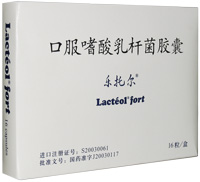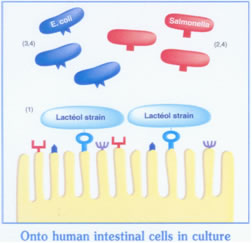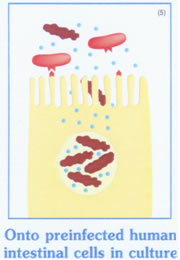| Download Lactéol Fort Brochure | Download Package Insert | Printer Friendly Product Info |

About Lactéol Fort
Introduction
Lactéol Fort is an efficient and safe antidiarrheal probiotic. It contains the Lactéol strain of Lactovacillus acidophilus LB from human origin, and has been prescribed worldwide for more than 30 years. PUMC Pharmaceutical has imported and marketed the product in China since early 1998, with an approved indication for the treatment of diarrheas of non-organic origin in adults, children and infants.
Special Manufacturing Process
Heating Treatment
A special "heating treatment" process for lyophilization obtains high bacterial concentrations, which provides Lactéol Fort's sachet and capsule formulations with high concentrations of active substance.
| Sachet | Capsule | |
|---|---|---|
| Lactéol Fort | 340 mg | 170 mg |
| L. acidophilus LB | 10 billion | 5 billion |
| Culture medium | 160 mg | 80 mg |
Unique Active Mechanism of Lacteol
The lactobacilli contained in Lactéol Fort are able to adhere to intestinal cells. By inhibiting the ability of pathogens to adhere to and invade these intestinal cells, Lactéol Fort acts against the infectious process of diarrhea and stops symptoms rapidly. Its mechanism of action is a natural antidiarrheal activity in symbiosis with the intestinal ecosystem.
Inhibition of adhesion of microorganisms responsible for diarrhea

Antimicrobial activity of the culture medium against extracellular and intracellular pathogenic germs

(1) Chauviere G., et al., Adhesion of human Lactobacillus strain LB to human enterocyte-like Caco-2 cells. Journal of General Microbiology. 1992, 138: 1689-1696.
(2) Chauviere G., et al., Competitive exclusion of diarrheagenic Escherichia coli (ETEC) from human enterocyte-like Caco-2 cells by heat-killed lactobacillus. FEMS Microbiology Letters. 1992, 81:213-218.
(3) Coconnier M.H., et al., Inhibition of adhesion of enteroinvasive pathogens to human intestinal Caco-2 cells by Lactobacillus acidophilus LB decreases bacterial invasion. FEMS Microbiology Letters. 1993, 110:299-306.
(4) Coconnier M.H., et al., Adhering heat-killed human Lactobacillus acidophilus, strain LB, inhibits the process of pathogenicity of diarrhoeagenic bacteria in cultured human intestinal cells. L. Diarrhoeal Dis. Res., Dec. 1993, vol.4: 235-242.
(5) Coconnier M.H., et al., Antibacterial effect of the adhearing human Lactobacillus acidophilus Strain LB. Antimicrobial Agents and Chemotherapy, May 1997, Vol. 41, No.5: 1046-1052.


